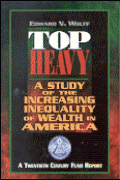We Americans have always flattered ourselves that we have more of two good things than almost anyone else: democracy and opportunity. To be sure, neither is simple; American ethos is not static, nor is it without contradictions. We reinvent ourselves through immigration; our democracy suffers from low voter participation; our economy often seems to be in relative decline; our cities sometimes are viewed from the suburbs as if they were foreign nations. Still, in the past, the democratic foundation has held while economic opportunity has provided the glue that bound together American’s oddly shaped parts. However, there is evidence that the “glue” that has provided economic stability and growth in the United States might be faltering.
Over the last several years, many studies have established that the working population of the United Sates—especially men with less than a college education—no only are doing more poorly than their parents, but their real wages are declining. In the 1990s, American families in every income category enjoyed income growth—and the poorest families had the highest rate of all. However, the average was high because it was reflection of high income growth for the top 20 percent of families, and a significant fall in income for the poorest 20 percent. As a result, nearly half the families in the country today have lower real income than they did in 1973.
In the pages that follow, Edward Wolff, adds data and provides analysis concerning wealth to our current knowledge about trends in income distribution. While wealth inequality always has been greater than income inequality, Wolff reports remarkable increases in wealth inequality in recent years. Startlingly, Wolff makes the assessment that the United States has gone from a position of less wealth inequality among its citizens than in Europe to greater wealth inequality than is found in those class ridden societies.
From the data analysis, Wolff then moves to make significantly bold set of policy suggestions to help curb economic inequality and stimulate real economic growth. He suggests that we should ultimately ignore the growing inequality and exclude from consideration tax policy options that attempt to ameliorate the situation. But surely these subjects are worth discussing, of only to understand the forces that challenge democracy and economic opportunity. With a remarkably large segment of the population losing ground in wealth and income, the inevitably greater insecurity this group faces must be a root cause of the anger that is shaking the democratic system
Authors
